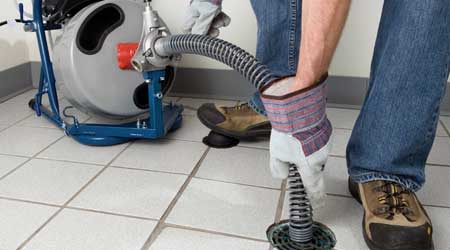Every day your kitchen sink, bathroom sink, and shower send waste and other particles through the drains. This buildup over time can cause clogs or other plumbing problems.
A clogged drain can create water backups, odors, and other issues. In addition, clogs can also damage your pipes and plumbing fixtures.
Clogs and Backups
Most homeowners experience a clogged drain from time to time. Hair, soap scum, sanitary products, kitchen waste, and more usually cause this.
If one or more of your drains clog at once, it could be a sign that you have a sewer backup in your home’s plumbing system. A sewage backup is a serious problem, so you should immediately call a plumber or experts from Bob Oates Sewer & Rooter, for instance, to clear the line.
Typically, this happens in your sinks and toilets but can also occur in shower or laundry drains. It may be a clog in the pipes connected to those drains or a problem in your main sewer line beneath the ground.
As discussed earlier, the most common clogs in drains are from food particles and grease. These can get stuck in your sink or shower drain, causing the drain to stop working.
In addition, a buildup of soap scum or hair can clog your shower drain. This can also cause the water to drain slower and smell bad.
If you are experiencing a slow-moving drain, try to plunge the clog or use a tool designed for removing hair from pipes. You can also pour a kettle of hot water down the drain. This should do the trick, but if it does, you may have a bigger problem and need to call a plumber.
Smells
A foul smell from your drains is a sign of a problem in your plumbing system. Bacteria, sewage, or mold can cause these smells, but they usually have simple DIY solutions.
First, check if a gas vent prevents the odor from escaping the house. If it is, it could indicate that your scent is from sewer gas.
Another possibility is a clog in your drains collecting waste and attracting bacteria. It’s essential to clean your gutters regularly to prevent these clogs from becoming more prominent.
Pour some bleach into your drain: Bleach is an effective disinfectant that can kill many bacteria that cause smelly pipes. You can pour some of this into your drain and let it run until it clears up.
Try Some Vinegar and Baking Soda: A mixture of vinegar and baking soda can also help to solve smelly drain problems. Mix a cup of vinegar with baking soda and then pour it down the drain.
Lastly, you can use a drain snake to break up clogs that may be causing the odor. If the clogs are too stubborn, you may need to hire a professional to remove them.
Contact a plumbing company immediately if you notice a nagging smell in your drains. They can inspect your home’s plumbing system and identify the problem before repairing it.
Health Issues
Owning a home is a significant investment, and keeping your drains clean is essential to ensure your property’s safety. Without regular drain cleaning, you leave your home vulnerable to clogs, backups, and water damage.
While a dirty and clogged drain is not the most appealing thing to think about, it’s one of the most significant issues that can arise. Dirty, stagnant water can contain harmful germs and bacteria that can affect your family’s health and cause other problems.
Often, a clogged drain will create a foul odor in your home that can be unbearable. This can be caused by a buildup of grease or other substances that have been flushed down the drain and are now rotting in the pipes.
Additionally, a dirty drain can also breed microorganisms like mold and mildew. This can make your home a breeding ground for allergens, negatively impacting your family’s health.
Furthermore, a clogged drain can create a hazardous environment for your pets. This can lead to various issues like respiratory problems, gastrointestinal upset, and fungal infections.
There are a variety of chemicals that are commonly used in drain cleaners, but they can be very dangerous for your health. These chemicals can release “volatile organic compounds” that can be toxic to your air. It’s best to go natural and use homemade solutions to keep your drains in good condition.
Damage to Pipes
Professional plumbers use a powerful machine that pushes water through your pipes at high pressure during regular drain cleaning. The high-pressure water helps to dislodge any dirt and debris that might have built up over time.
It also eliminates odors and residue from the inside of your drain. This prevents clogs from forming in the future and saves you money on plumbing repairs in the long run.
An excellent way to clean your drains at home is by using hot water and baking soda. The scrubbing action of the ingredients makes it easier for wastewater to travel through the gutter.
Another popular method for cleaning your drains is using a special hose called hydro jetting. This process uses pressurized water to remove any dirt, debris, or grease that has built up in your pipes.
Some of the most common things that can clog your drains are hair, soap, and other items that don’t dissolve easily in water. Taking a few minutes to dispose of these items properly will keep them from building up in your drain and causing blockages.
These clogs will not happen all at once but will build up over time, making your drains harder to clear and causing more problems. This is why having your gutters professionally cleaned about once every six months is essential.
